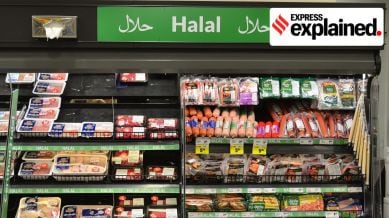What is ‘halal’, and who certifies a product as being so?
UP Police have received a complaint alleging that some companies have started certifying their products as ‘halal’ and are thus ‘toying with the public's faith’. Is halal just a type of meat? What are these certificates?

The UP government has ordered a statewide ban on products being sold with halal certificates with immediate effect.
This happened after an FIR was lodged at Lucknow’s Hazratganj police station on Friday (November 17) in which the complainant alleged that “some companies have started certifying products as halal in order to increase their sale among a community,” and thus were “toying with the public’s faith”.
We explain what is halal, what exactly are halal certificates, and who issues them.
What does ‘halal’ mean?
Halal is an Arabic word that loosely translates to ‘permissible’ in English. In the Quran, the term ‘halal’ is contrasted with the term ‘haram’ — meaning ‘forbidden’ — and is used to designate the categories of lawful (and allowed) and unlawful (and forbidden).
The term is particularly associated with Islamic dietary laws to refer to food that is procured, processed, and traded in compliance with Islamic belief. It is similarly to the ‘kashrut’ dietary rules followed by orthodox Jews, who only consume food that is ‘kosher’, i.e. permitted in Jewish law.
The two items of food that are most commonly considered haram (non-halal) are pork (pig meat) and intoxicants (alcohol). Even meats that are not pork must satisfy specific requirements relating to their source, the way the animal was killed, and how it was processed, to qualify as halal.
When is meat halal?
In the Indian context, halal is mostly used to refer to the slaughtering technique used by Muslims.
This involves killing the livestock or poultry through a single cut to the jugular vein, carotid artery (which carries blood from the brain to the heart and vice versa), and the windpipe with a sharp knife at the front of the neck. Animals must be alive and healthy at the time of slaughter, and all blood must be drained from the carcass. During the process, recitation of prayers, known as shahada, is also prescribed.
This is in contrast to the ‘jhatka’ method, preferred by many Hindus and Sikhs, which involves delivering a powerful, single blow to the back of the animal’s neck, decapitating it. Jhatka specifically involves stunning animals prior to slaughter, a practice that is not allowed in Islam. Most meat shops owned by Muslims announce their products as ‘halal’ whereas those owned by Hindus or Sikhs declare themselves as ‘jhatka’ establishments.
Can non-meat products also be halal?
Despite the popular usage mentioned above, halal simply means ‘permissible’ in Islamic law — this does not have to do with meat at all. So vegetarian food would be generally considered permissible or ‘halal’, unless it contains alcohol. So would fish and shellfish.
The meaning can also go beyond food, and technically, any consumable item can be deemed halal or haram, depending on whether they are produced in accordance with Islamic law. For instance, medicines often use animal byproducts to create casings or capsules. The halal/haram consideration would be important in such a situation, as Muslims do not want to consume capsules containing pig-fat gelatin.
Similarly, the term may also be used in the context of personal care products, packaging materials, animal feed, etc.
What are halal certificates? Who issues them?
Halal certificates simply tell a consumer whether a product meets the requirements for being considered halal or not. They do not indicate the presence of meat, or in and of themselves, have nothing to do with meat.
India does not have an official regulator for the certification of halal products. Rather, there are various halal certifying agencies that provide companies, products, or food establishments halal certifications. Their legitimacy lies in their name-recognition among Muslim consumers as well as recognition from regulators in Islamic countries.
For instance, the certification company Halal India, on its website mentions that certification is provided after a rigorous process of lab testing and multiple process audits. Halal India’s certification is recognised by Qatar’s Ministry of Public Health, the UAE’s Ministry of Industry and Advanced Technology, and Malaysia’s Department of Islamic Development, among others. These international accreditations are particularly important for products meant for export to Islamic countries.